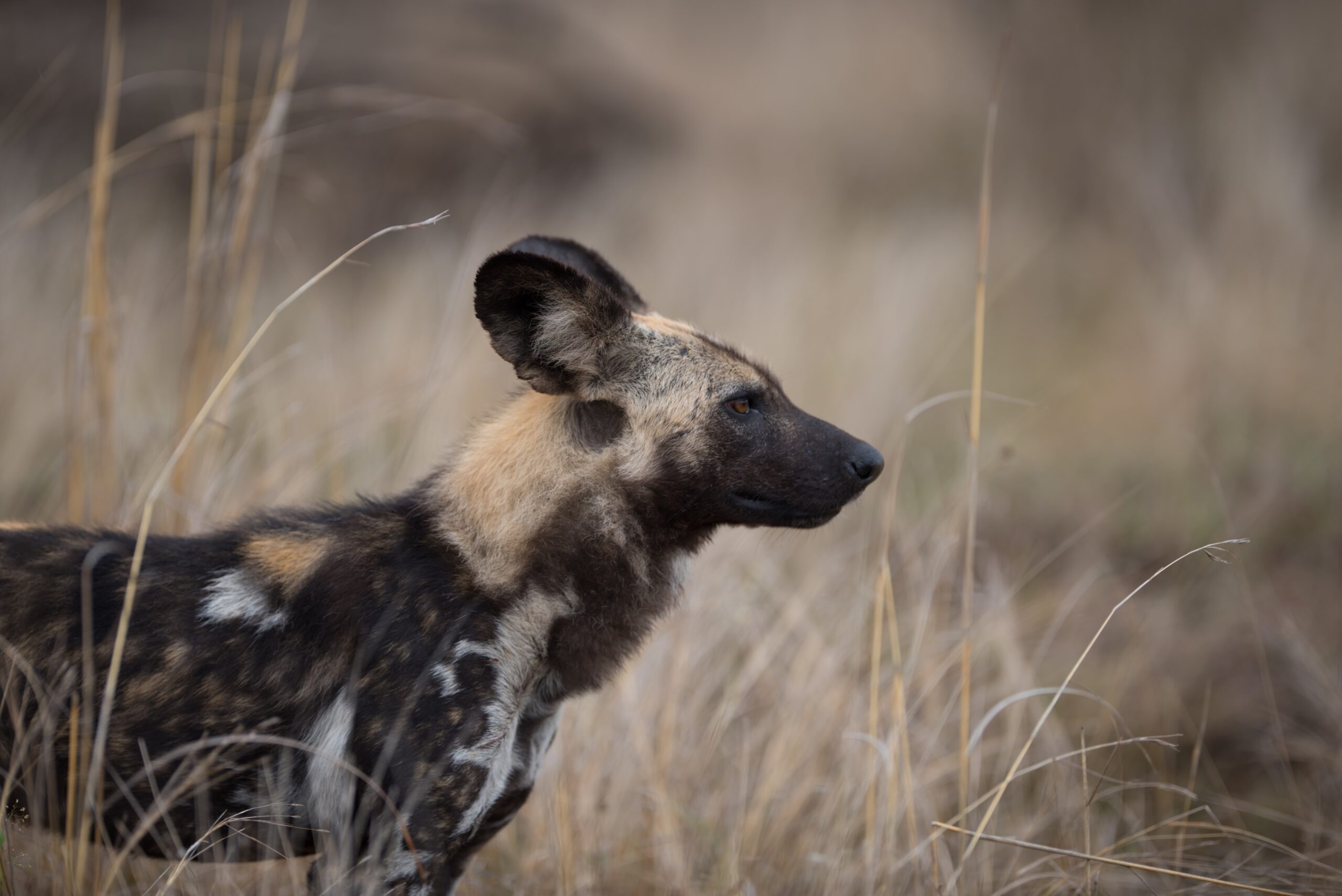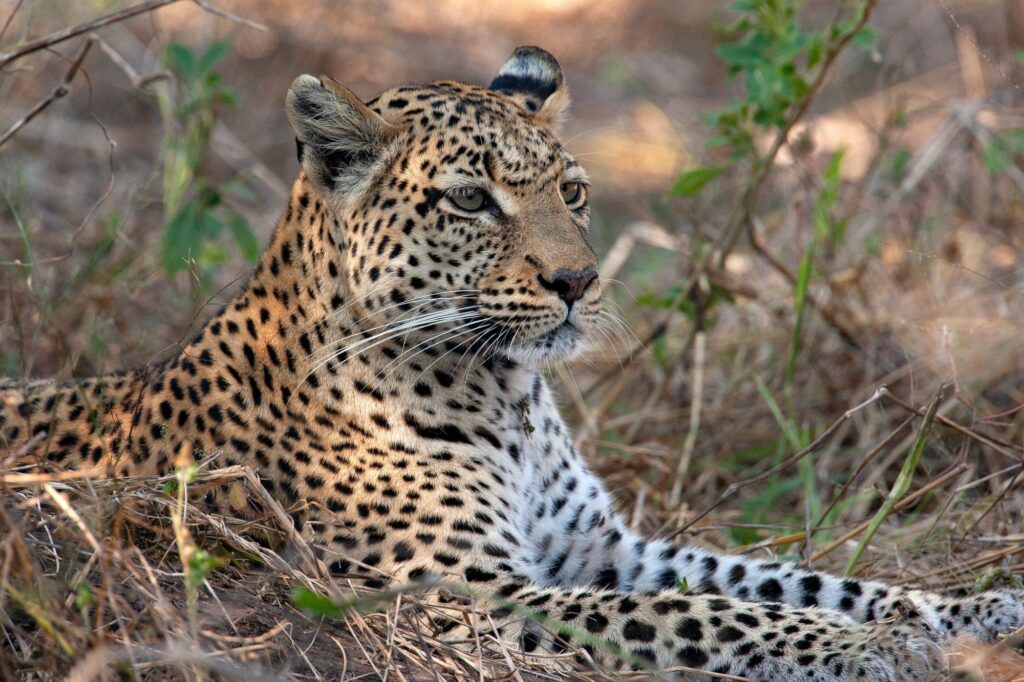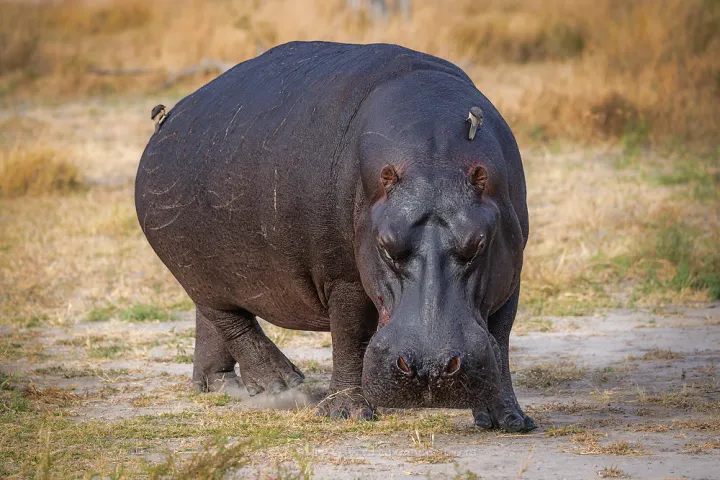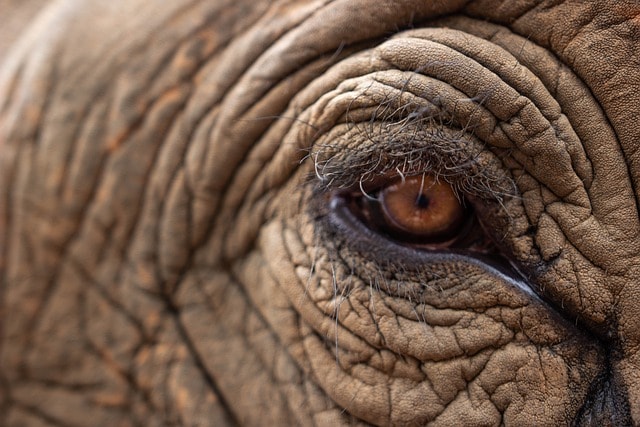African wild dogs are endangered due to habitat loss, human-wildlife conflict, diseases, prey scarcity, and roadkill. One of the key questions is, why are the African wild dogs endangered? Human activities, disease outbreaks, and competition with other predators contribute significantly. This article explores these threats and discusses ongoing conservation efforts to save these unique animals.
Key Takeaways
- African wild dogs are endangered due to habitat loss, fragmentation, and human-wildlife conflict exacerbated by human population growth.
- Disease threats, particularly from interactions with domestic dogs and other predators, significantly impact wild dog populations, necessitating vaccination and monitoring efforts.
- Conservation efforts, including establishing protected areas, community engagement, and genetic diversity programs, are critical for preserving African wild dogs and their ecosystems.
Habitat Challenges
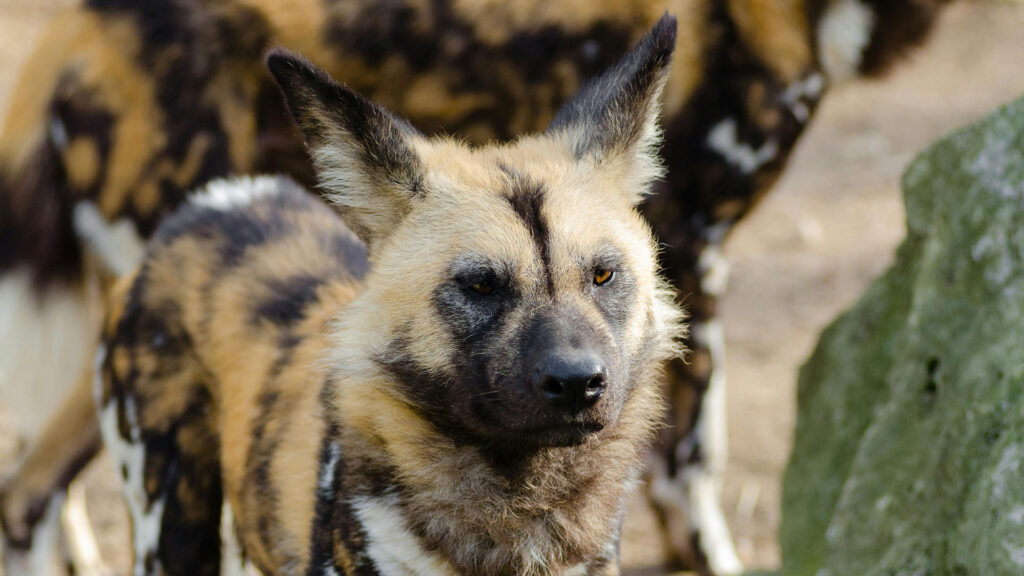
Habitat challenges significantly contribute to the endangered status of African wild dogs. Expansion of human settlements leads to habitat fragmentation and loss, affecting their survival. Human activities encroach on their habitats, reducing living spaces and increasing human-wildlife conflict.
Conservation groups are tirelessly working to mitigate these issues, but the challenges remain daunting.
Habitat Loss
Deforestation and agricultural expansion are major threats to African wild dogs, leading to habitat loss. Expanding human settlements degrade the quality of their african wild dog habitats, heightening risks from snares and other dangers.
Large-scale conservation areas are crucial for providing wildlife corridors and reducing human-wildlife conflict. Addressing habitat loss is vital for the survival of African wild dogs and other species.
Habitat Fragmentation
Habitat fragmentation creates isolated patches, complicating the movement of African wild dogs and hindering their ability to find mates and maintain genetic diversity. Limited access to continuous habitat also heightens the risk of human and domestic animal encounters, leading to conflicts.
Efforts are underway to connect fragmented habitats, enabling safe passages for African wild dogs and other threatened species.
Human-Wildlife Conflict
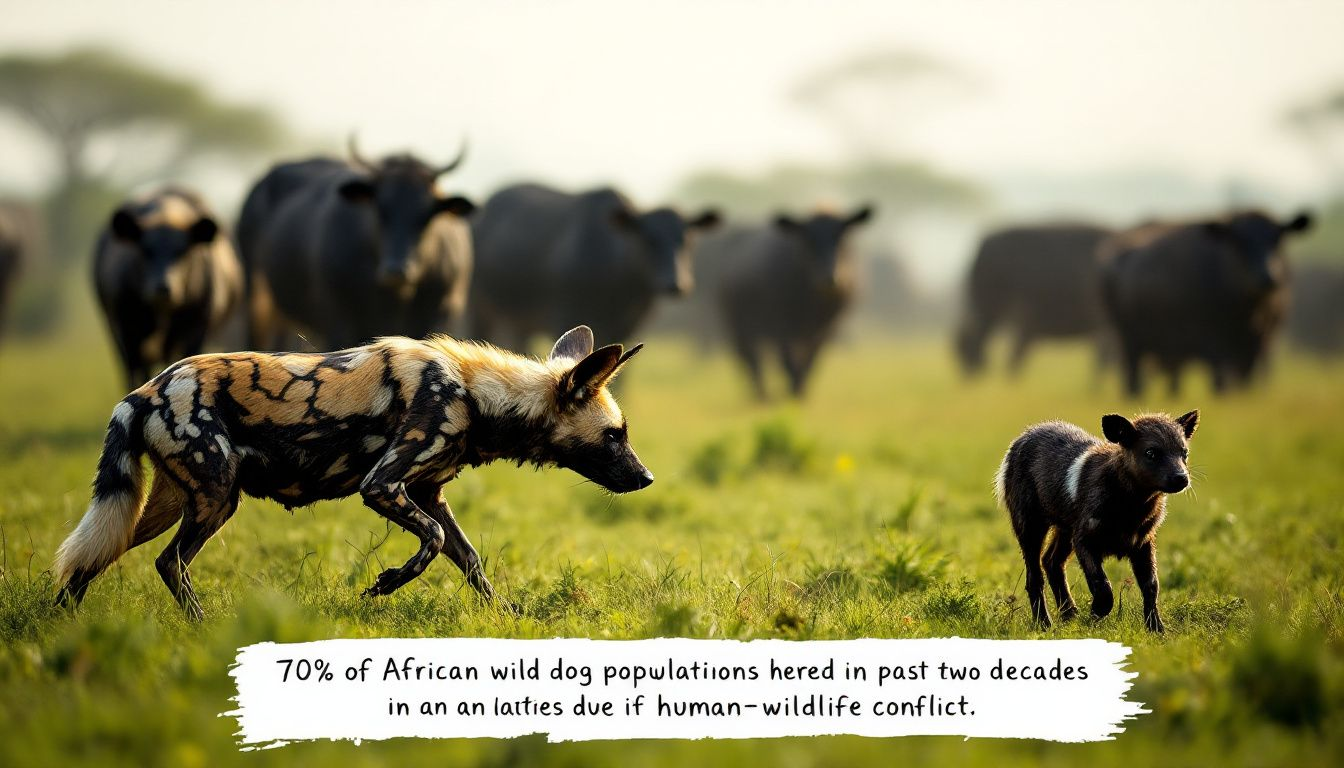
Human-wildlife conflict poses a major threat to African wild dogs, often leading to retaliatory killings. Growing human populations and expanding agriculture drive these conflicts, worsened by habitat fragmentation, bringing wild dogs closer to human settlements.
Involving local communities in conservation efforts helps reduce conflicts and promote tolerance towards African wild dogs.
Livestock Predation
Occasional livestock predation by African wild dogs results in financial losses for farmers, who may resort to lethal measures. This creates a cycle of conflict, intensifying animosity between humans and wild dogs.
Implementing effective livestock enclosures and community programs can mitigate conflicts, protecting both livestock and wild dogs.
Negative Perceptions
Negative perceptions among local communities contribute to the endangered status of African wild dogs. Misunderstandings about their behavior lead to them being viewed as pests, prompting lethal actions from farmers.
Educating communities about the ecological role of African wild dogs and dispelling myths can change negative perceptions and foster coexistence.
Disease Threats
Disease is a severe threat to vulnerable African wild dog populations. They are susceptible to infectious diseases like rabies, canine distemper, and parvovirus, which can devastate entire packs. A single outbreak can significantly reduce their numbers, highlighting the need for effective disease management and prevention.
Canine Distemper
Canine distemper is a lethal viral disease affecting African wild dogs. In Tanzania, an outbreak killed 49 out of 52 wild dogs in two months. The rapid spread of this virus underscores the urgent need for vaccination and disease monitoring programs to protect these populations.
Other Infectious Diseases
African wild dogs also face threats from other infectious diseases like rabies and canine parvovirus. Interactions with domestic dogs, which can be carriers, often exacerbate the spread of these diseases.
Vaccination programs and minimizing contact between wild and domestic animals are effective measures to control the spread of these diseases.
Prey Scarcity
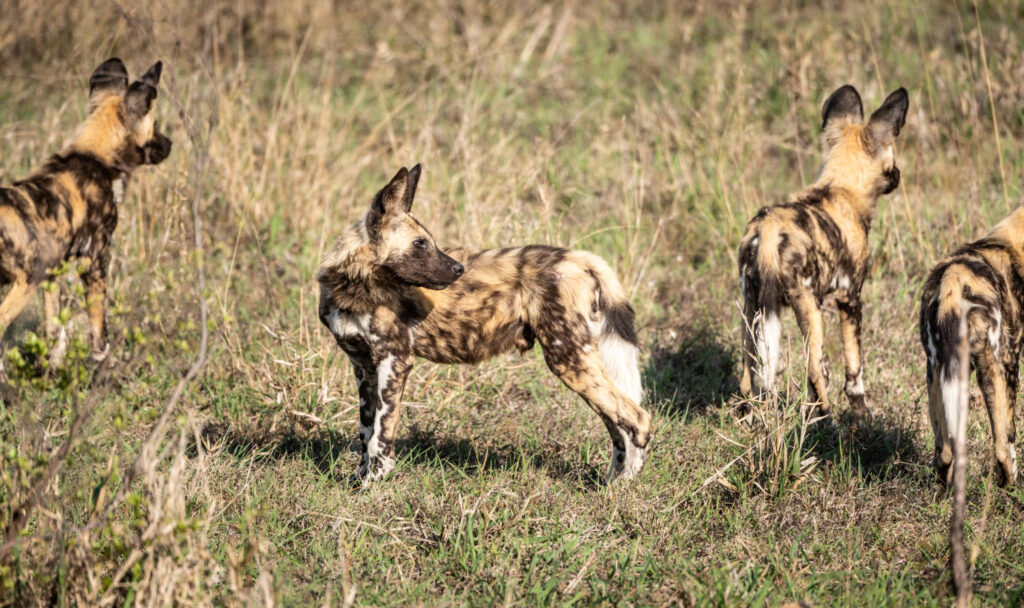
Prey scarcity, driven by habitat loss and competition with larger predators, critically affects African wild dogs. The availability of prey is vital for their survival. Overhunting and habitat destruction cause fluctuations in prey populations, complicating estimates of African wild dog population decline.
Competition with Larger Predators
Competition with larger predators like lions and hyenas significantly impacts African wild dogs. Lions dominate and sometimes kill wild dogs, contributing to their mortality. In the Serengeti, increased competition from spotted hyenas, whose population surged by 150%, has pushed wild dogs out of prey-rich areas, worsening food scarcity.
Hyenas frequently steal kills from wild dogs, compounding food scarcity. In response, wild dogs sometimes hunt livestock, leading to more human-wildlife conflict.
Mitigating these competitive pressures is crucial for African wild dog conservation.
Decline in Wild Prey
Overhunting and habitat destruction cause declines in wild prey populations, threatening African wild dogs. They primarily hunt medium to large browsers like kudu and bushbuck, which are significantly impacted by habitat loss. This reduction in prey jeopardizes their survival, emphasizing the need for conservation efforts to protect these food sources as African wild dogs hunt.
Roadkill and Snares
Roadkill and snares are common and tragic threats to African wild dogs. Expanding human infrastructure increases the likelihood of wild dogs being run over by vehicles, sometimes deliberately.
Snares set for other wildlife often trap and kill African wild dogs, posing a significant threat to their populations.
Increased Infrastructure
The expansion of roads and urban areas increases mortality rates for African wild dogs in high-traffic areas. Expanding human settlements force them to navigate through dangerous territories, resulting in more roadkill incidents.
Conservation efforts must address the impact of infrastructure development on wildlife to mitigate these threats.
Poaching and Snares
Illegal bushmeat poaching significantly threatens African wild dogs, causing drastic population declines. Snares set for other wildlife often trap and kill African wild dogs, leaving them unable to escape.
Tackling poaching and the use of snares is crucial for conserving these endangered species.
Conservation Efforts
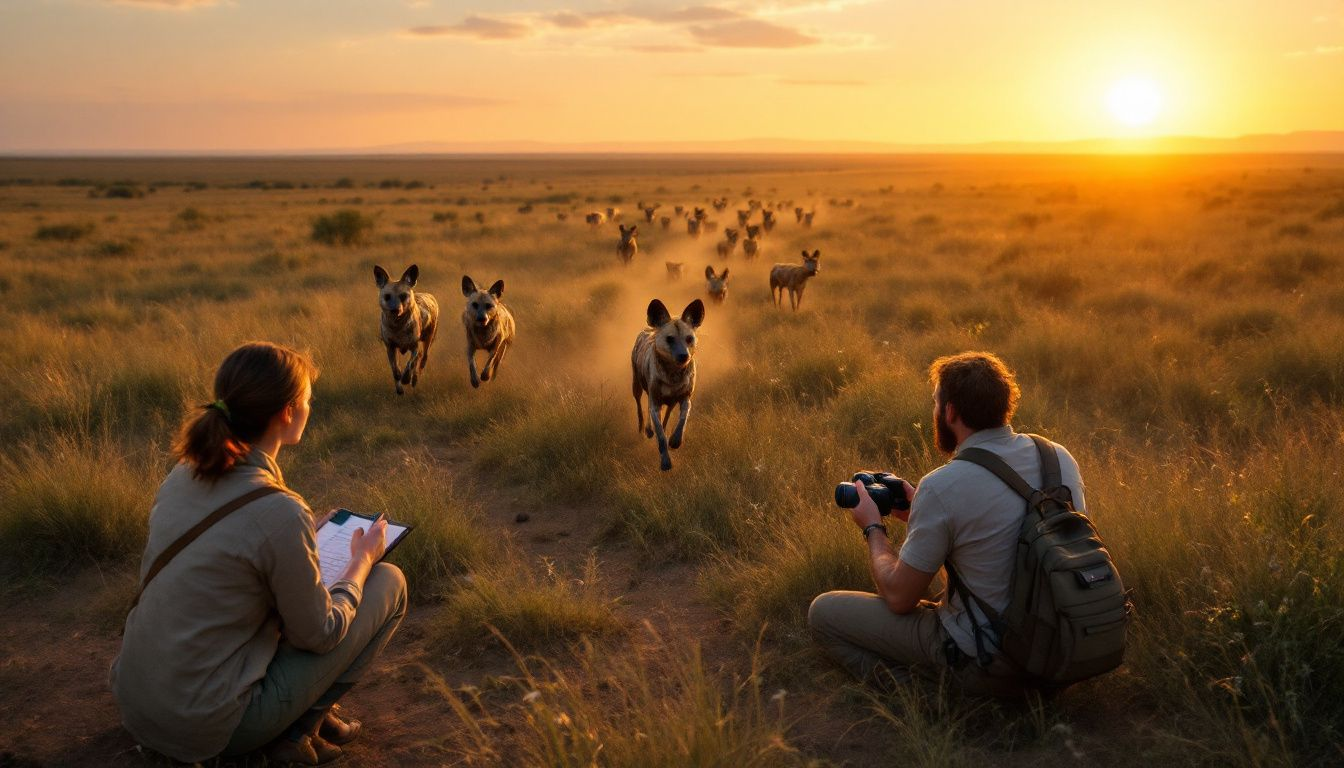
Conservation efforts are essential for the survival of African wild dogs. Supporting conservation groups can significantly aid in protecting these endangered species and their habitats.
Financial contributions and advocacy for wildlife protection laws are key components of these efforts.
Protected Areas
Establishing protected areas is crucial for maintaining biodiversity and providing safe habitats for African wild dogs. The Kavango-Zambezi Transfrontier Conservation Area, for example, links various protected regions to support wild dog populations.
Advocating for laws that protect these areas can significantly bolster conservation efforts.
Community Engagement
Engaging local communities fosters shared responsibility for wildlife protection. Community-based programs enhance local understanding and support for African wild dog conservation, reducing human-wildlife conflicts.
Volunteers working with local communities play a vital role in these efforts.
Genetic Diversity Programs
Genetic diversity programs are crucial for maintaining healthy populations of African wild dogs. Captive breeding programs and techniques like sperm freezing help increase genetic variation, vital for the species’ survival.
Monitoring movement patterns also helps manage genetic diversity and health.
What You Can Do to Help
Individuals can significantly contribute to the conservation of African wild dogs through volunteering, raising awareness, and supporting conservation groups.
Volunteer Opportunities
Volunteering with conservation projects can make a substantial impact. Volunteers track, monitor, and care for African wild dogs, gathering critical data for wildlife management.
These efforts are vital for conserving endangered species.
Advocacy and Awareness
Raising awareness about the threats faced by African wild dogs can influence public support for conservation policies. Advocacy efforts can encourage more people to support conservation groups and drive legislative changes to protect these animals.
Donations and Support
Donations to reputable wildlife foundations directly contribute to the protection and recovery of African wild dogs. Financial support helps establish protected areas, engage local communities, and maintain genetic diversity programs, ensuring viable populations for the future.
Summary
In summary, African wild dogs face numerous threats, from habitat fragmentation and human-wildlife conflict to disease and prey scarcity. Conservation efforts, including protected areas, community engagement, and genetic diversity programs, are crucial for their survival. However, the fight to save these endangered species requires the collective effort of conservation groups, local communities, and individuals like you.
Inspiring action and fostering a sense of shared responsibility are key to ensuring the future of African wild dogs. By volunteering, raising awareness, and supporting conservation initiatives, we can make a significant impact on the survival of these remarkable animals. Together, we can help secure a future where African wild dogs thrive in their natural habitats.
Frequently Asked Questions
Why are African wild dogs endangered?
African wild dogs are endangered because of habitat loss, human-wildlife conflict, disease, and a decline in available prey. Addressing these challenges is crucial for their survival.
How does habitat fragmentation affect African wild dogs?
Habitat fragmentation negatively impacts African wild dogs by isolating packs, restricting their movement, and increasing conflicts with humans and domestic animals. This can lead to decreased survival rates and challenges in hunting.
What diseases threaten African wild dogs?
African wild dogs face significant threats from diseases like rabies, canine distemper, and canine parvovirus, which can severely impact their populations. Addressing these diseases is crucial for their conservation and survival.
How can individuals help in the conservation of African wild dogs?
Individuals can significantly contribute to the conservation of African wild dogs by volunteering their time, raising awareness about their plight, and supporting conservation organizations with financial donations. Your involvement can make a meaningful difference.
Why is genetic diversity important for African wild dogs?
Genetic diversity is vital for African wild dogs as it enhances their ability to adapt to environmental changes and increases resilience against diseases, ultimately supporting their survival.

